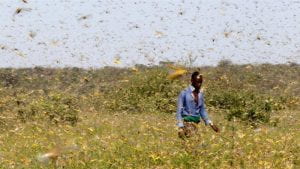In response to this blog post.
I chose to respond to Cameron’s blog post because it uncovers a serious crisis currently in the shadow of COVID-19 news. Their post describes the large swarms of locusts overtaking farmland throughout the Horn of Africa. As of May 13th the locusts continue to spread rapidly; officials warn they may migrate east as far as the Indo-Pakistan border and even to West Africa.
How international organizations are addressing this crisis closely relates our study of the global food economy. Developing countries (like those on the Horn of Africa) face comparatively more severe repercussions from an agricultural crisis like this than in developed countries. Agriculture comprises a much higher portion of their GDP and they lack sufficient resources to respond to such a disaster. The locust swarms are also infesting extremely food insecure nations like South Sudan. Then why has funding been slow and insufficient? Historically (and still today) international trade institutions are manipulated so that the world food system works in favor of developed nations. As discussed by Clapp, developed countries dump their subsidized food in global markets while developing countries struggle to compete with the cheap costs. There seems to be little international movement towards helping the region during this crisis. Developing countries continue to lack influence in intergovernmental organizations like the U.N yet are facing increasingly devastating environmental crises like this one.
This issue therefore clearly connects to the idea of “triple inequality” discussed in class. As Cameron mentions, climate change has been linked to the locust swarms. The affected countries have had little historical influence on global warming, yet pay the brunt of the climate costs while having little capacity to adapt and respond to this disaster. The “triple inequality” theory, in combination with the structuring of international organizations and the world food system overall, elucidates how the system is stacked against these developing countries. Sufficient funding should be provided in response to this crisis, but we must also think of larger reforms that reshape these global systems by putting power into the hands of climate change threatened countries. How can we reform these systems so that they are fair, just, and work for all, not just the most powerful?


